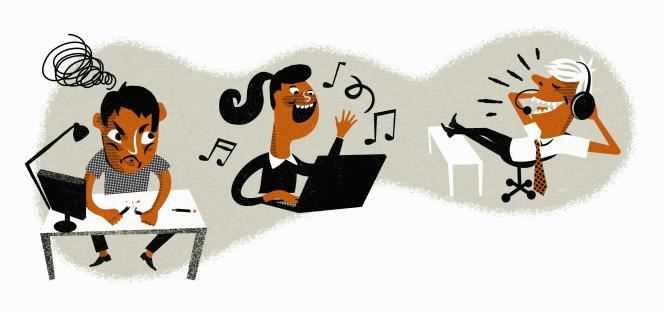Office notebook. Irritable people are on the increase in the open space. By making the obligation of telework obsolete, on August 30, the Minister of Labor gave back the hand to the companies to freely organize the return on site. On the employee side, it is not the great enthusiasm: in a Slack / OpinionWay survey published on August 31, 38% say they would prefer to change employers rather than return to 100% face-to-face. Either way, hybrid work is the new normal. And since the end of August, open spaces are slowly coming back to life and rustling again.
But employees, who still hear the lapping waves or the familiar voices of their homes in their ears, have lost the habit of putting up with the work environment. Back after a year and a half of deserting the offices, they developed a new noise intolerance. “The intelligible conversations are the most intensely perceived annoyance”, according to the National Research and Safety Institute for the Prevention of Work Accidents and Occupational Diseases (INRS).
Noise in the open space is obviously regulated by legislation. The regulations protect employees from excessive and lasting decibel levels, but not from noise pollution that distracts them. The chatting of the office neighbors, the triggering of the printer, the roar of the air conditioning, the reading aloud of Patrick’s emails, the sizzling of the music that comes from Elodie’s headphones have a disruptive effect that employees had forgotten and that is not harmless.
Physiological protection
The induced discomfort can generate stress, fatigue, sleep disturbances and blood pressure, says Paul Avan, physicist at Clermont-Auvergne University and research director at the Institute for Hearing. “The hearing system is certainly capable of filtering out relevant messages in a complex soundscape (the effect cocktail party), but noise pollution can make this task exhausting and induce stress, which is not necessarily harmful to hearing but to health: noise has harmful extra-auditory effects ”, he writes in the quarterly Responsibility & Environment of the Institut Mines-Télécom.
And natural defenses are of no help. If the organism has physiological protection devices against continuous noise, it has less against discontinuous noise. In a study on impulse noise (“ Impulse noises, a poorly understood danger? », 2020, by Jonathan Terroir), the INRS explains that the contraction reflex of the muscles of the middle ear to reduce the number of decibels perceived occurs after a certain latency period, which can be harmful to hearing.
You have 7.75% of this article left to read. The rest is for subscribers only.
